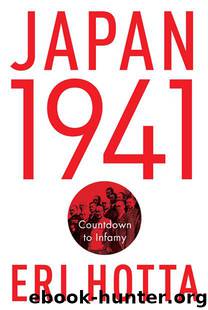Japan 1941 by Eri Hotta

Author:Eri Hotta
Language: eng
Format: azw3, mobi, epub
ISBN: 9780385350518
Publisher: Knopf Doubleday Publishing Group
Published: 2013-10-29T05:00:00+00:00
Nomura conveyed this message to the president on August 28. Roosevelt complimented the “tone and spirit of it” and again mentioned Juneau as a meeting place. To Nomura, the location mattered little. The ambassador was encouraged because, as Hull noted, Roosevelt explicitly told him that he considered the prime minister’s message a “step forward,” that he was “very hopeful,” and that he would be “keenly interested in having three or four days with Prince Konoye.”
Nomura called on Hull at his hotel apartment that evening to express his gratitude for having arranged the presidential interview. He said that Juneau should be as agreeable a location as any other and that all that mattered from the Japanese point of view was that the meeting take place very soon. He described the likely composition of the Japanese delegation: “about twenty persons, of whom five each would be from the Foreign Office, the Army, the Navy and the Japanese Embassy at Washington.” The period between September 21 and 25 would be suitable for the meeting, the ambassador added, and the prime minister would leave Japan about five days before the president left Washington so that the two leaders would arrive simultaneously.
Nomura’s enthusiasm was quickly dampened. Hull wasn’t really keen on the idea of a summit. He alluded to the recent “difficulties [that] had been encountered in regard to certain fundamental points which had caused delays that finally culminated in Japan’s taking action contrary to the conversations.” He was, of course, talking about Indochina. Before a summit meeting could be held, he said, he would have to have clearer answers from the Japanese to the most pressing issues endangering U.S.-Japan ties—namely, Japan’s Axis alliance, Japan’s troops in northern China and Inner Mongolia, and Japan’s commitment to the application of the principle of nondiscrimination in international commercial relations.
Nomura, while trying to regain his composure, said the China issue would, in his view, be the most difficult to reach a prior agreement on. He suggested that the matter be left for the conference itself. Hull correctly responded that the United States was involved in the matter because Japan had requested that it exercise its good offices. “We could work together, Japan and the United States,” Hull said, “in order to make the most of the potentialities of the 500,000,000 people of China as a trading nation”—a sentiment fully shared by Roosevelt. He repeated that “there should be an agreement in principle on the outstanding questions of importance prior to the holding of the meeting” and that “the meeting would serve the purpose of ratifying agreement in principle already reached.” Wouldn’t that be better for everyone’s peace of mind? Nomura felt that a Juneau conference was now much less likely than it had been just a few minutes earlier.
Konoe was still confident that a summit meeting would take place. On August 29, he and his supporters gathered at a resort at the foot of Mount Fuji to draft a proposal for a preconference agreement, just as Hull had requested.
Download
This site does not store any files on its server. We only index and link to content provided by other sites. Please contact the content providers to delete copyright contents if any and email us, we'll remove relevant links or contents immediately.
The Secret History by Donna Tartt(19092)
The Social Justice Warrior Handbook by Lisa De Pasquale(12191)
Thirteen Reasons Why by Jay Asher(8912)
This Is How You Lose Her by Junot Diaz(6889)
Weapons of Math Destruction by Cathy O'Neil(6281)
Zero to One by Peter Thiel(5802)
Beartown by Fredrik Backman(5759)
The Myth of the Strong Leader by Archie Brown(5509)
The Fire Next Time by James Baldwin(5449)
How Democracies Die by Steven Levitsky & Daniel Ziblatt(5219)
Promise Me, Dad by Joe Biden(5154)
Stone's Rules by Roger Stone(5088)
A Higher Loyalty: Truth, Lies, and Leadership by James Comey(4964)
100 Deadly Skills by Clint Emerson(4927)
Rise and Kill First by Ronen Bergman(4790)
Secrecy World by Jake Bernstein(4753)
The David Icke Guide to the Global Conspiracy (and how to end it) by David Icke(4720)
The Farm by Tom Rob Smith(4514)
The Doomsday Machine by Daniel Ellsberg(4490)
